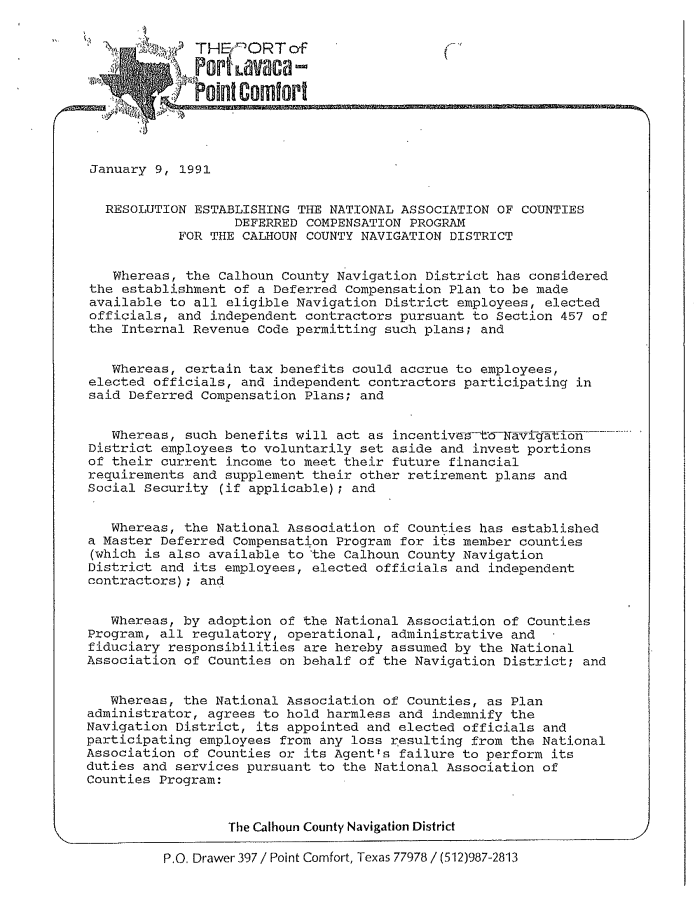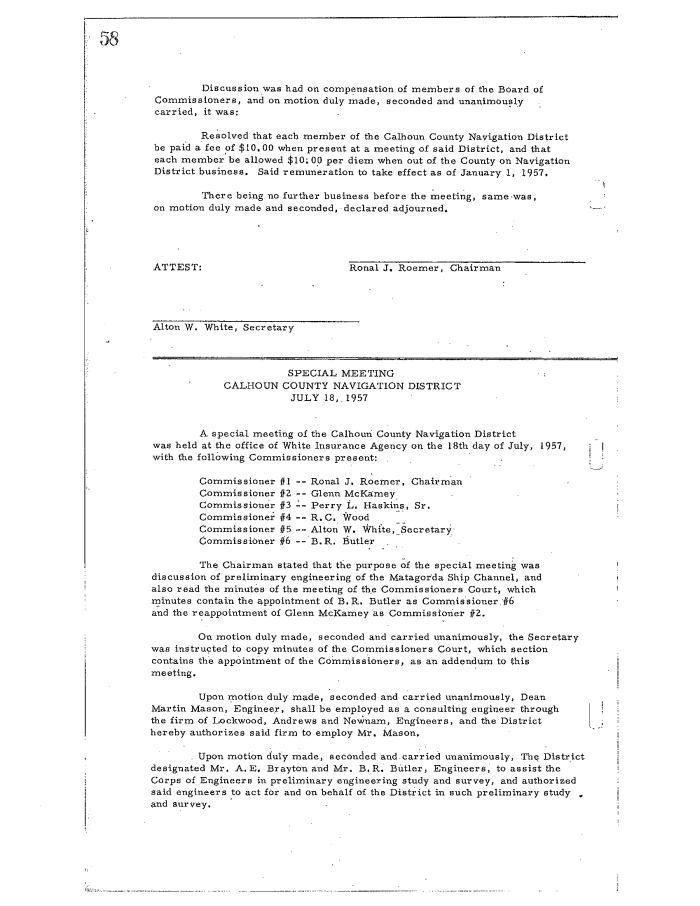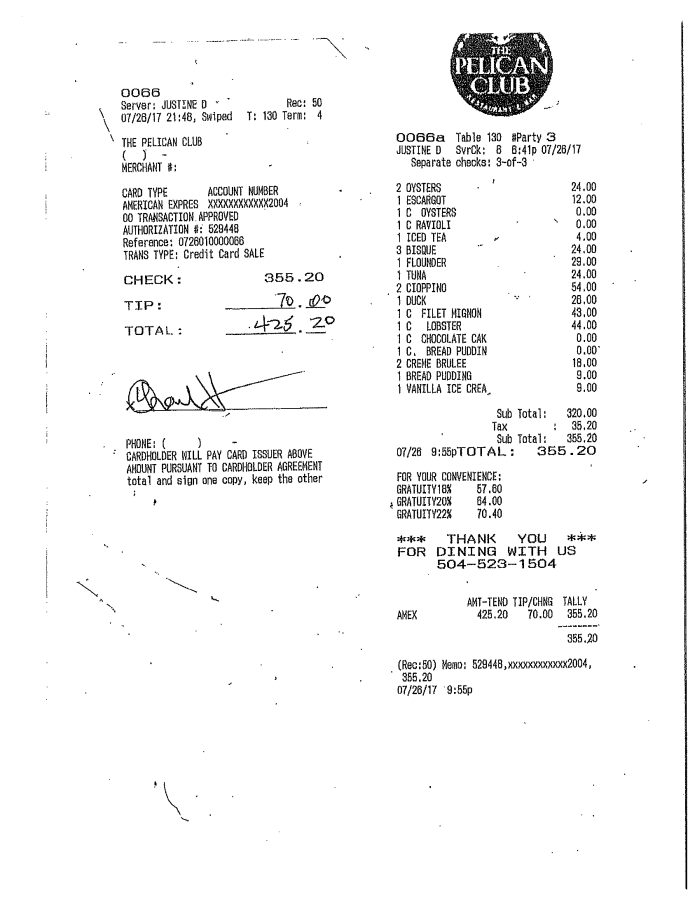The Calhoun Port Authority is the only deep port along the Gulf Coast to offer a retirement plan for its board members.
The Victoria Advocate called 24 deep ports along the Gulf Coast that are members of and that responded to a compensation survey by the American Port Authorities Association.
The association did not ask about a retirement plan for board members, so the Advocate did.
The Advocate also asked 21 additional ports along the Gulf Coast, most of them shallow ports, if they offered retirement benefits to their board members. They did not.
Every month, the Calhoun Port Authority deposits $125 into each board member’s retirement or deferred compensation plans.
The retirement plans are part of about $630,000 the board members – who meet once a month and do not oversee the day-to-day operations of the port – have paid themselves in the past decade.
“It sounds like the board is in the position to feather its own nest with little to no accountability,” said Craig McDonald, director of Texans for Public Justice, a nonprofit that started in Austin in 1997 to take on political corruption.
Steve Ellis, the vice president for another nonprofit watchdog group, Taxpayers for Common Sense, agreed.
“Whether it’s to be a dogcatcher or the president of the United States, you run for office to serve the public, not to line your own pockets,” he said.
In January 1991, the Calhoun Port Authority board approved a resolution that made themselves eligible for the same retirement as port employees.
Port officials would not say, though, when they started paying into the board members’ retirement or deferred compensation plans.
Ports of similar size and ports that have four times the gross operating revenues, such as the Port of Galveston, do not offer retirement plans for their board members.
“In accordance with our charter, we do not offer any benefits to our trustees,” Port of Galveston Director Rodger Rees said.
This is true even for ports in other states, some of which see at least a hundred times more tons of commodities come through them.
“Our board members do not – and I repeat, do not – receive retirement benefits,” said Judith Adams, a spokeswoman for the Alabama State Port Authority.
Board compensation
Calhoun Port Authority board members get paid for doing a part-time job they were elected to do while their counterparts in the Crossroads do not.
They pay themselves $400 for attending one regular monthly meeting and one special meeting and $250 for attending any meeting held in the same month after that, Calhoun Port Authority Director Charles Hausmann said.
The board members can set aside that amount or a portion of it to be invested by the port and its agent and accrue interest for their retirement.
It’s not clear whether the board does this, nor is it clear when they decided on these compensation rates.
No board member returned phone calls for comment.
When the Advocate requested under the Texas Public Information Act any meeting agenda, minutes and resolutions that showed the board approving these rates, the port said it did not have any such documents.
The port did, however, produce records that show the board’s compensation used to be much less.
In 1957, the board paid itself $10 to attend meetings.
The watchdog groups said an outside party should set the board members’ compensation, not the board members.
Ellis said this is the kind of thing that feeds the public’s cynicism about government.
“Obviously, you want to make sure you get qualified and competent people and they are being compensated for their time, but anything more than that is excessive. If they don’t like the salary, don’t run for office,” Ellis said.
Tami Keeling, Victoria school board president, and Buddy Kamin, Citizens Medical Center board member, serve for free.
“Sometimes, we get sausage and eggs,” Kamin said, chuckling, “but the focus is on the citizens of our community and making sure they get the best care.”

Travel
Keeling said she covers her cost to travel to testify as a board member.
She most recently testified before the Texas Legislature in Austin against using public money for private schools. Keeling estimates it cost her $120 per minute to give testimony that was confined to three minutes.
“I think that’s important because it demonstrates my investment in what I have to say as a member of the public and as an elected school board trustee. If I pay my own way, I am speaking solely from that position and not paid for by anybody,” Keeling said.
The Calhoun Port Authority board members have a different philosophy.
They get a $250-per-day travel stipend, plus they are reimbursed for their travel-related expenses, which in the past decade totaled about $297,000 on top of the more than half a million they pay themselves.
When the Advocate asked how far board members would have to travel in order to receive the stipend, the port did not respond.
The Advocate also asked for the receipts of some of these port travel expenses.
One receipt the port produced showed Hausmann charged a $425.20 meal at the Pelican Club Restaurant and Bar in New Orleans in July 2017, which is when the Gulf Intracoastal Canal Association was having its annual convention.
The receipt shows board members dined on oysters, escargot, cheese ravioli, bisque, flounder, tuna, duck, filet mignon, lobster, chocolate cake, bread pudding, creme brulee and vanilla ice cream.
Another receipt showed the port paid for board member Dell Weathersby’s wife to stay four nights at a hotel in Long Beach, Calif., in October 2017, which is when the American Association of Port Authorities was having its annual convention.
At its most recent meeting, the board approved Hausmann and Board Chairman Randy Boyd attending the American Association of Port Authorities 2018 convention in Valparaíso, Chile, for three days this month.
The port has spent $68,915 on Boyd’s travel since 2008, but the board chairman doesn’t have the highest travel expenses.
Board member Tony Holladay did at $80,465 during that same time period.
Lack of oversight
The state doesn’t oversee the Calhoun Port Authority or similar special purpose taxing districts, and the Legislature has made few attempts to do so.
In 2017, State Sen. Lois Kolkhorst, R-Brenham, wrote and passed a bill that required the Texas Comptroller’s Office to create a special purpose taxing district database, but that guide doesn’t tell voters that the Calhoun Port Authority Board is giving itself retirement or compensation.
It instead lists Hausmann’s telephone number and email address, the port’s website, and its tax rate and states that it has no debt and more than $250,000 in revenue.
Kolkhorst, who declined an interview, said in a statement that the database was meant to be “an accountability tool for taxpayers to help them attend meetings, monitor funds and ask informed questions.”
“Sunlight,” she wrote, “is often the best disinfectant, and in the next legislative session, I plan to enhance the database with even more details.”
State Rep. Geanie Morrison, R-Victoria, who serves as the chairwoman of the Transportation Committee and on the Texas Ports, Innovation and Infrastructure Select Committee, said she needed more information to comment about the issue. When the Advocate provided her with additional information, she did not provide a comment.
State Rep. Wayne Faircloth, R-Galveston, who serves on the same port committee as Morrison, proposed legislation that would have required the Texas Sunset Commission to review a number of ports’ governance, management, operating structures and compliance with the Texas Constitution.
The Calhoun Port Authority was included in that. However, minutes from the committee’s meetings show the bill was never discussed, and so it did not make it out of committee. Faircloth could not be reached for comment.
State Rep. Todd Hunter, R-Corpus Christi, whose district used to include Calhoun County, also was not available for an interview, but said in a statement, “It may be early to determine issues of oversight on all ports. However, a discussion on issues and matters affecting ports may be constructive.”
Hunter has spoken repeatedly about the need for government transparency, most recently in May at Texas A&M University-Corpus Christi. He said then that it would be a priority of his when the Legislature meets again in 2019.
After learning about what Kolkhorst did during the last legislative session about special purpose taxing districts, Craig McDonald, of Texans for Public Justice, said disclosure is not reform nor is it regulation.
“Disclosure and transparency are a positive thing so these practices aren’t undertaken in the dark, but they are not the end,” he said. “Too often, legislators hide behind disclosure over regulation as a way to move an issue off the table.”
What’s next?
In the meantime, voters are the only ones who can provide oversight of the Calhoun Port Authority, which in the past has been mostly out of the public’s view.
For example, the last time Boyd stood for an election was in 2007. Then, he won by 44 votes.
That could change, though, as at least two challengers to Boyd have emerged, although neither knew until the Advocate told them when Boyd’s term expired.
“I heard through the grapevine that it’s up next year, but I don’t know,” said Luis De La Garza, who is retired from STP Nuclear Operating Company and owns dozens of apartments in Port Lavaca. “They don’t freely publish that, and they sure as heck don’t bring it up in the meeting minutes. I personally logged onto their website to go look at the meeting minutes, and the last time they were published on there was in 2012.”
The port did update its website this month, and Boyd, Weathersby and J.C. Melcher Jr. are up for re-election in May.
De La Garza and Paul Lauterbach, an environmental engineer also considering running against Boyd, learned from the Advocate about the board members’ perks.
“This just infuriates me,” Lauterbach said. “Why in the world are we treating these people better than we treat our own city employees?”
One of the boards De La Garza serves on is the Calhoun County Tax Appraisal Review Board. He said the county paid him $1,100 for attending 11 meetings and some meetings went all day. He said he would step down from the tax appraisal review board if elected to the Calhoun Port Authority board because that would be a conflict of interest.
“Tax dollars don’t come easy, man, and I’m on the front lines. To know that they are being spent that way, it just rubs me raw,” De La Garza said first of the port board’s decisions to hire former U.S. Congressman Blake Farenthold and to compensate themselves and give themselves retirement.
Both men also said they did not think the public had much to show as far as economic prosperity for what the port has compensated the board members over the years. For example, a plan to build a multimillion-dollar terminal at the port to handle imported liquified natural gas, which was proposed once in 2004 and again by another company years later, never materialized.
“I think everything has kind of just fallen into their lap. I mean, Formosa wanted to expand,” De La Garza said.
They say the Advocate’s previous reporting about Boyd – specifically, that the board chairman suggested the port hire Farenthold as its first full-time lobbyist after Farenthold did his dredging business a favor – has made them feel even more cheated as taxpayers.
“I don’t have any problem with people making money if they are making money for the port,” Lauterbach said, “but this whole thing seems to be in self-interest, not in the public interest.”
















Get Social